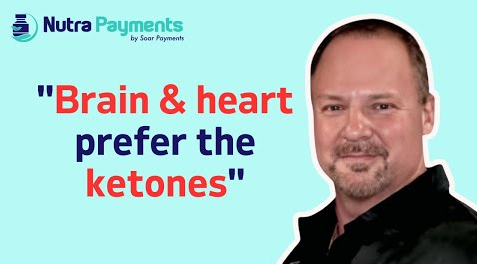Keto & The Stress Response
Why Getting Your Ketones Exclusively From Your Own Body Can Be A Bad Idea
Wait a minute? What gives? You’re probably confused and wondering just what exactly we’re talking about, right? “But I thought our body producing as many ketones as possible was exactly what we’re supposed to do?” It’s not that simple. As with all things in life, the truth usually lies somewhere in between. The short answer here is that we want to chase optimal health-not ketone numbers. And the main reason why we don’t want to only get our ketones from our own metabolism is because of stress. Remember, we at Real Ketones believe in a flexible approach over a traditional, strict, orthodox ketogenic diet.
Stress Response & Mining For Gold
Think of ketone metabolism as mining for gold. Yes, ketone molecules are all they are cracked up to be in the keto space-excellent for optimizing health, brain & neurological function, longevity, energy production, immunity, as well as fitness and physical performance. But in order to get them endogenously-or from your own physiological processes inside of you-your body has to work.
As a review, in the face of starving-or starving-simulated states like fasting, carbohydrate restriction, extreme caloric deprivation, and stretched out meal frequency-the body produces ketones. Because glucose & energy, in general, are not readily available as an energy source, your body has to liberate its own fat for fuel. Ketones are chemicals produced by your liver in this state to support the energy process. In some ways, ketones are essentially a fourth macronutrient-an energy-producing molecule along with protein, carbs, and fats. Your body in turn can then use these ketone bodies for energy.
Metabolic Flexibility
What people don’t realize is that there’s a difference between being able to burn fat for energy and higher levels of ketosis. Being in an ‘ideal’ state of ketosis is actually a transient state. It refers to the amount of ketone molecules in your body. This high strung state of ketone presence is ever-changing and is not required for your body to be able to burn its own fat for fuel. That mechanism is known as metabolic flexibility-or fat adaptivity. This is your body essentially being able to liberate free fatty acids via a process known as beta-oxidation. This is how your body burns its own fat for fuel.
It’s important to remember that your body still needs to be able to run on carbohydrates efficiently for fuel. We feel that many in the keto space push strict, traditional ketogenic diets on people that are not sustainable long-term. A big piece of this is because it actually can disarm your body’s ability to run off of carbs for fuel.
Have you ever followed a more conventional low carb approach with keto for a prolonged period of time, only to find out that when you reintroduced carbs you felt, ‘drunk’, sluggish, and couldn’t really perform physically or mentally?
This is not the fault of the carbohydrates themselves, but rather ‘training’ your body to only be efficient at running off of fat. The same way most of our culture has de-programmed their ability to run off their own body fat for fuel because of excess carbs, sugar, and other diet maladies, many in the keto space mistakenly do in the opposite direction. For most of the population, this is why it’s key to have some carbohydrates included in your diet at a higher clip than keto traditionally features.
The key takeaway here is that the fat-burning component of ketosis is not impaired by regularly having more carbohydrates than keto generally allows. Once you fix and reset this ability of your body to burn its own fat once again, it doesn’t go away unless you totally reverse your dietary habits in the opposite direction for a prolonged period of time.
Basically you want to focus on building a fat-burning, fat-adapted, flexible metabolism and not get suck stressing yourself out by chasing the ketone numbers your body is producing.
Is Fat Burning Stressful?
Remember that your body has to work to burn fat for fuel. If you’re eating enough dietary fat, you are providing an energy supply. At the same time, if you’re always creating global stress in the system by doing too much of some combination of excess calorie restriction, prolonged fasts, severely restricting carbs, etc. this can be system overload.
When fat is mobilized for energy, this occurs through a process called lipolysis. With lipolysis comes other chemical messenger hormones to the party, including but not limited to cortisol, glucagon, norepineprhine, and epinephrine. These are adrenaline hormones. While we absolutely do want fat-burning to happen, too much ‘mining for fat’ without sufficient energy coming from carbs pushes us too far on the opposite side, which is not a great endpoint, either.
Exogenous Ketones & A Happy Medium
Thankfully the answers here are fairly straightforward and simple. Don’t cut out carbs completely. The leaner and more active you become, the more you’ll be able to include. Those of you doing rigorous exercise that is carb-dominant, like weightlifting, should likely cycle in more carbohydrates on a regular basis.
But what about ketones? We know how good they are for us? Can’t we have our ketones and eat them too? YES! Exogenous ketones-a blend of natural salts that flood your system with ketones regardless of what kind of diet you’re on-are a solution here. Exogenous ketones provide the body with the benefit of ketones without always having to have your body stress itself out to get to peak ketosis. This allows you to focus more on the fat-burning side of the equation (metabolic flexibility), be able to have a diet better suited to you (including a little more, to substantially more, carbs than a traditional keto diet depending on your starting point), as well as provide your body with all the benefits of having an abundant supply of ketones.
This doesn’t impair results, either-it actually heightens them. Recent research has shown that a traditional diet (non-keto) with a mild calorie restriction typically not sufficient enough to induce much results-combined with exogenous ketones-actually results in substantial weight loss with most of that weight loss coming from fat. Not only that but speaking of stress-exogenous ketones can reduce the effects of stress by as much as 40%! Not bad for something so drop-dead simple.
With that, we leave you with the following:
-
Many of us should lower our carbs in general-but don’t cut them out entirely.
-
Some of those who are leaner and engaging in higher levels of exercise should probably have more carbs more regularly.
-
Don’t purely chase ketone levels-focus on being as healthy and fit as you can be!

 ACCOUNT
ACCOUNT
 CART
CART





